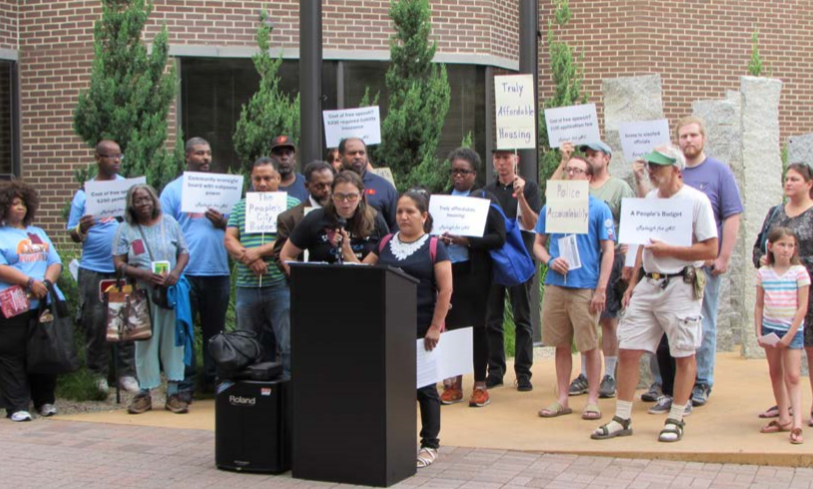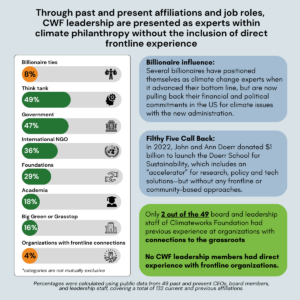Southern cities are growing – many at a much more rapid pace than the national average. According to the U.S. Census, eight out of the 15 cities with the largest population gains are in the South.
This is due in large part to historically cheap real estate, minimal regulation (which conservative legislators intend to keep in place) and corporate relocations from the North fueled by massive tax breaks.
While unemployment is at a historic low, stagnant wages and precarious employment have made it hard for the average southerner to see much fruit bearing from their labor.
Organizers and community leaders are moving forward with city-based strategies to bring equity and democracy into development, because place does matter.
Despite anti-democratic state pre-emption tactics, well-documented voter suppression tactics and gerrymandering, grassroots coalitions and local movements remain resilient and are fighting back.
Georgia STAND-UP, the long-time Atlanta affiliate of Partnership for Working Families, has fought for a more inclusive city amidst an era of tremendous growth and rapid displacement that will have a lasting impact on the city’s skyline and cultural fabric for generations to come.
Investment in movement-building organizations and leaders in the region by philanthropy is paramount to sustaining and preserving the South’s rich history of resistance.
Similar to findings pointed out in Grantmakers for Southern Progress and NCRP’s series As the South Grows, the Partnership believes that building sustainable, and local, sources of funding and lifting up voices from the region is key to building an even stronger movement for the long haul.
There isn’t a better time to organize with and build community in the South than now. I have been inspired by the tenacity of Stand Up Nashville (SUN) to put communities and transparency first as its city experiences the largest development frenzy in decades.
This year, the coalition was instrumental in the passage of the “Do Better” Bill, legislation that requires developers and contractors to disclose wages, hiring practices, and health and safety records as a condition of receiving tax breaks from the city.
The coalition has been one of the loudest voices calling attention to the injuries and fatalities crisis in the construction industry, where 16 workers have died from preventable injuries on the job in the last two years alone.
SUN recently launched a campaign demanding a Community Benefits Agreement (CBA) at a proposed Major League Soccer (MLS) stadium development, securing the first agreement of its kind in Tennessee. This CBA sets a new standard for how development should happen in Nashville, and potentially cities across the South, with affordable housing, wage standards, training and enforcement requirements.
The Durham Equitable Development Collaborative is also organizing to develop a similar equitable development model in the face of rapid redevelopment of public housing in its downtown core, all while navigating the retaliatory nature of the state’s General Assembly.
The collaborative is led by Power Up NC and groups like Durham CAN, the North Carolina A. Philip Randolph Institute and Durham For All.
For more than a decade, the Partnership for Working Families and its network for 19 grassroots and community organizations has driven and supported comprehensive trans-local campaigns to transform cities and institutions that have historically benefitted from and perpetuated racialized inequality.
Building movements and building leaders in the South is critical to the dismantling of the legacy of slavery and creating real power and victories for working people of color and immigrants.
“For people of color, it’s always implied that we are beneficiaries of the system – not that we are the system,” said SUN Co-Chair Odessa Kelly. “And once we shift that perspective, that’s when we start to change things. When we change the perspective, then we change what people desire and want, and that’s how we make changes on the state and national level.”
Over the last two years, we have developed a set of recommendations based on what we are learning about best practices in equitable development campaigns in Nashville, Tennessee, and Durham, North Carolina, thanks in part of generous support from the Open Society Foundation.
We developed these recommendations with our allies at Estolano LeSar Advisors, a community-development consulting firm with decades of experience advising cities, foundations and advocates.
Our project also provided local capacity and support to our community-based partners in both cities.
Organizing with communities and leaders in the South must be rooted in and respectful of the lives of the people most impacted by the transformation.
And, while conservative and corporate forces have dismantled or turned government on its citizens, local government remains one of the arenas where everyday people can have a say.
Recommendations for Building a New Model for Community-Centered Development:
Invest in people:
- Leadership development – both inside organizations and outside in the community, such as members and resident leaders – is core to building the confidence and expertise to move a program and campaign.
- Organize, organize, organize! We must empower residents to want and achieve greater access to the development decisions that affect their everyday lives. Building a coalition that represents diverse stakeholders and approaches is crucial. A campaign is only as strong as the people it reaches, beyond boardrooms and council chambers.
- Build power for the long haul, not just short-term solutions. The tools and strategies we covered are intended to set your communities on a trajectory for building power in cities and having a movement that continues beyond its first victory. There will be losses and struggles in the process.
Democratize development in our cities:
- Build statewide advocacy to ensure cities have all the policymaking tools at their disposal to alleviate crises, respond to the needs of their residents and create innovative policies that address displacement, unemployment, low wages and other issues.
- Adopt transparency and accountability policies, especially for projects receiving public subsidies, that provide the community with opportunities to learn about and engage in decisions made about publicly owned land and publicly subsidized developments in their neighborhoods that will affect their health and well-being.
- Empower communities with the tools and leverage to ensure that development creates benefits that protect workers, create good jobs and affordable housing, address environmental mitigation and identify other strategies to navigate state interference.
- Enlist elected leaders and local government staff as partners in developing solutions and in navigating state interference where possible.
You can find our toolkit here.
Jackie Cornejo is Southern region equitable development strategist at Partnership for Working Families. Follow @JackieCornejoG and @P4WF on Twitter.
Image courtesy of Partnership for Working Families
































































































































































































































































































































































































































